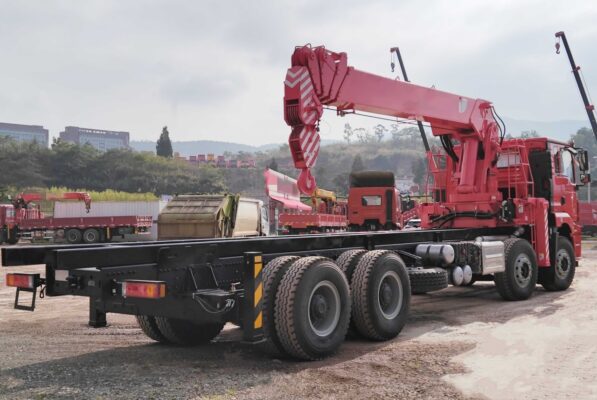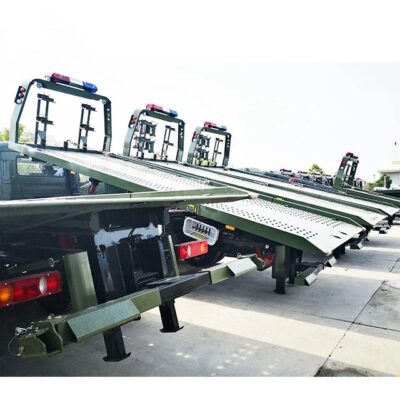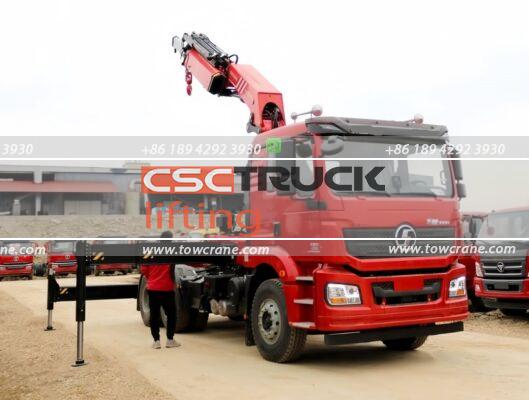Flatbed tow trucks, also known as rollback trucks, are a staple in the towing industry due to their versatility, safety, and reliability. These trucks are designed with a flat platform that can be hydraulically inclined and slid back to ground level, allowing vehicles to be driven or winched onto the bed. This article delves into the mechanics, benefits, applications, and maintenance of flatbed tow trucks, providing a comprehensive guide for those considering their use.
Mechanics of Flatbed Tow Trucks
Flatbed tow trucks are engineered with specific features that make them highly functional for a variety of towing needs:
- Hydraulic System:
- The hydraulic system is crucial for the operation of the flatbed. It allows the bed to tilt and slide back, making it easy to load and unload vehicles. The hydraulics ensure smooth and controlled movement, which is essential for handling vehicles safely.
- Winch:
- A powerful winch is typically installed on flatbed tow trucks to assist in pulling vehicles onto the bed. The winch can be operated remotely, allowing for precise control during the loading process.
- Steel or Aluminum Bed:
- The bed of the truck is usually made of steel or aluminum. Steel beds are durable and can handle heavier loads, while aluminum beds are lighter and resistant to rust, making them ideal for long-term use.
- Safety Chains and Straps:
- Safety chains and straps are essential for securing vehicles to the bed during transport. They prevent the vehicle from moving or shifting, ensuring safe and stable towing.
Benefits of Flatbed Tow Trucks
Flatbed tow trucks offer several advantages over other types of tow trucks, making them a preferred choice for many towing operations:
- Versatility:
- Flatbed tow trucks can handle a wide range of vehicles, from motorcycles and passenger cars to SUVs and small trucks. This versatility makes them suitable for various towing tasks.
- Vehicle Safety:
- Since the entire vehicle is lifted off the ground and secured on the flatbed, there is minimal risk of damage during transport. This is particularly important for all-wheel-drive, luxury, and vintage vehicles that require careful handling.
- Ease of Use:
- The loading process is straightforward, with the bed tilting and lowering to ground level. This ease of use reduces the risk of damage to the vehicle and simplifies the towing process.
- Accident Recovery:
- Flatbed tow trucks are ideal for recovering vehicles from accident scenes. They can transport severely damaged vehicles without causing further harm, making them essential for emergency response services.
- Off-Road Capabilities:
- Some flatbed tow trucks are designed with robust features to handle off-road conditions, making them suitable for retrieving vehicles from challenging terrains like mud, sand, or snow.
Applications of Flatbed Tow Trucks
Flatbed tow trucks are used in various scenarios, each requiring their unique capabilities:
- Roadside Assistance:
- Flatbed tow trucks are commonly used for roadside assistance, helping stranded motorists whose vehicles have broken down or are otherwise inoperable. They can safely transport the vehicle to a repair shop or another location.
- Vehicle Transport:
- These trucks are often used for transporting new, used, or classic cars over long distances. Their ability to safely carry vehicles without causing damage makes them ideal for dealership deliveries and car shows.
- Accident Recovery:
- In the aftermath of accidents, flatbed tow trucks are deployed to remove damaged vehicles from the scene. Their design ensures that even severely damaged vehicles can be transported without further deterioration.
- Illegal Parking Enforcement:
- Flatbed tow trucks are used by municipalities and private property owners to enforce parking regulations. Illegally parked or abandoned vehicles can be safely removed and transported to impound lots.
- Heavy Machinery Transport:
- Flatbed tow trucks with reinforced beds are capable of transporting heavy machinery and equipment, such as construction vehicles and industrial tools, providing a safe and efficient means of relocation.
Choosing a Flatbed Tow Truck
When considering the purchase of a flatbed tow truck, there are several factors to take into account:
- Towing Capacity:
- Ensure the truck has adequate towing capacity for the types of vehicles or equipment you plan to transport. Overloading the truck can lead to mechanical issues and safety hazards.
- Bed Length and Width:
- The dimensions of the flatbed should match the vehicles you intend to tow. A longer and wider bed can accommodate a greater variety of vehicles, providing more flexibility in your operations.
- Engine Power:
- A powerful engine is necessary for towing heavy loads, especially over long distances or challenging terrains. Consider trucks with engines that offer both power and fuel efficiency.
- Durability:
- The materials used in the construction of the truck, especially the bed, should be durable and resistant to wear and tear. Steel beds are robust, while aluminum beds offer corrosion resistance.
- Safety Features:
- Look for trucks equipped with advanced safety features such as anti-lock brakes, stability control, and backup cameras. These features enhance safety during towing operations and protect both the driver and the towed vehicle.
Maintenance of Flatbed Tow Trucks
Regular maintenance is crucial to keep flatbed tow trucks in optimal condition and extend their lifespan:
- Routine Inspections:
- Conduct regular inspections of the hydraulic system, winch, and bed to ensure they are functioning correctly. Check for signs of wear and address any issues promptly.
- Engine and Transmission Maintenance:
- Follow the manufacturer’s recommended service schedule for oil changes, filter replacements, and other engine and transmission maintenance tasks. Keeping these components in good condition is essential for reliable performance.
- Tire Care:
- Regularly inspect and maintain the tires, including checking for proper inflation and tread wear. Well-maintained tires ensure better handling and safety during towing operations.
- Cleaning:
- Keep the flatbed and other parts of the truck clean to prevent corrosion and other damage. Regular washing, especially after exposure to harsh weather conditions or chemicals, can prolong the truck’s lifespan.
- Record Keeping:
- Maintain detailed records of all maintenance and repairs. This helps in tracking the truck’s condition, scheduling future maintenance, and provides valuable information if you decide to sell the truck.
Conclusion
Flatbed tow trucks are an essential asset in the towing industry, offering unmatched versatility, safety, and efficiency. Their ability to handle a wide range of vehicles and situations makes them indispensable for roadside assistance, vehicle transport, accident recovery, and more. Understanding the mechanics, benefits, applications, and maintenance of flatbed tow trucks can help you make informed decisions whether you are considering purchasing one or selecting a tow truck service provider. By prioritizing key features such as towing capacity, bed dimensions, engine power, and safety, and ensuring regular maintenance, you can maximize the utility and longevity of these valuable vehicles.













